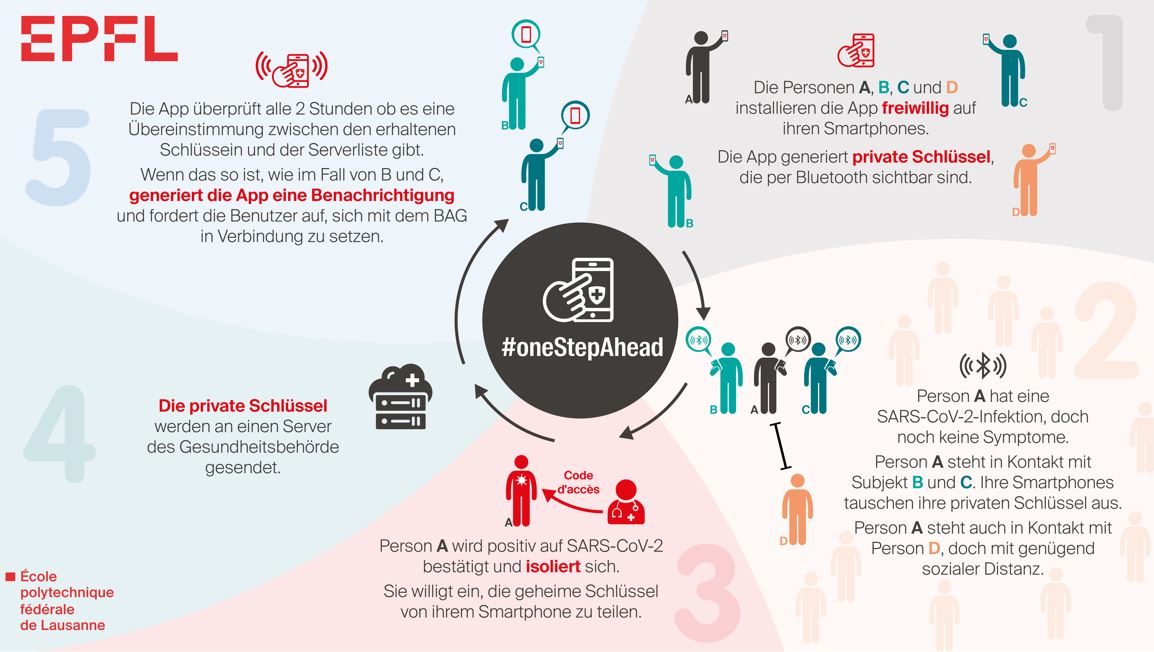Corona app enters pilot phase
As part of a pilot phase, the SwissCovid app has been tested in Switzerland since May 25. The app can be used with the latest iOS and Android versions. According to the survey, 70 percent of the population welcomes the introduction of the app.

The pilot phase with the SwissCovid app launched today will last until the end of June 2020 at the longest and is intended to uncover any technical deficiencies and problems in usability as well as medical processes before the app is released to the public.
Contact tracing, the consistent tracking and interruption of infection chains, is an important measure to prevent the resurgence of the Covid 19 infection rate, as the Federal Office of Public Health (FOPH) emphasizes. It serves to control the epidemic in the long term. The app complements the classic contact tracing of the cantonal authorities. It is an additional tool that promises to be of great benefit. With the app, potentially infected people can be warned at an early stage and the further spread of the virus can be contained.
Who is testing the app?
In the pilot phase, employees of the Federal Institutes of Technology in Lausanne and Zurich, members of the armed forces in training service, employees of individual federal and cantonal administrations, employees of various hospitals and clinics as well as selected institutions and organizations are participating.
How does the app work?
The app uses Bluetooth technology. According to ETH, the application works as follows: Using Bluetooth, the app searches for other smartphones nearby that also have the app installed. If two such devices are found, they exchange random beacons - a kind of private key - provided they were less than two meters apart for more than 15 minutes. These parameters were set by the epidemiologists and could be adjusted within the app if new information about the virus made that necessary.
If a user of the app tests positive for Corona, he or she receives a code from the cantonal physician. If the infected person decides to enter the code in the app, other users are notified that they were exposed to a risk of infection through contact with an infected person. The notification is automated and anonymous, without drawing conclusions about an individual or the location of the possible infection. Because the project has many legal and ethical dimensions, the researchers are working closely with various federal agencies, ETH said.
Motion data is not recorded
According to the FOPH, the app is not technically capable of recording movement data. Rather, it records the proximity over a certain time to other smartphones with the app. No individuals can be personally traced using this data, according to the FOPH release.
The Federal Data Protection and Information Commissioner, the National Center for Cybersecurity and the National Ethics Commission agree that the decentralized approach best meets the demand for maximum privacy protection. Once the Corona crisis is over, the system will be shut down, the FOPH release says.
Safety test possible
The population should be guaranteed the maximum possible protection of privacy when using the SwissCovid app, according to the FOPH's media release. To achieve this, the app must have a correspondingly high level of security. To achieve this requirement, the source codes of the Swiss proximity tracing system will be available for a broad security test with the public, the Public Security Test, starting May 28. Experts and interested parties can thus subject the system to an endurance test.
Source: BAG / ETH
What the public thinks about the app
At the end of April 2020, the FOPH commissioned the Sotomo research center to survey the population's attitude towards a proximity tracing app by means of a population survey throughout Switzerland.
The basic attitude towards the proximity tracing app is positive, according to this survey. 70 percent of the population welcome its introduction, as the FOPH writes. The majority of respondents see the app as an approach to curbing the spread of the new coronavirus. The high willingness to install the app (59%) is an expression of the idea of solidarity anchored in society. This was shown without massive differences between the most important demographic groups.
However, slightly more than half of these 59 percent are not yet quite sure whether they want to install the app and only say "rather yes" to it. However, the survey also showed that the higher the level of knowledge about the app's functionalities, the greater the willingness to install it.









